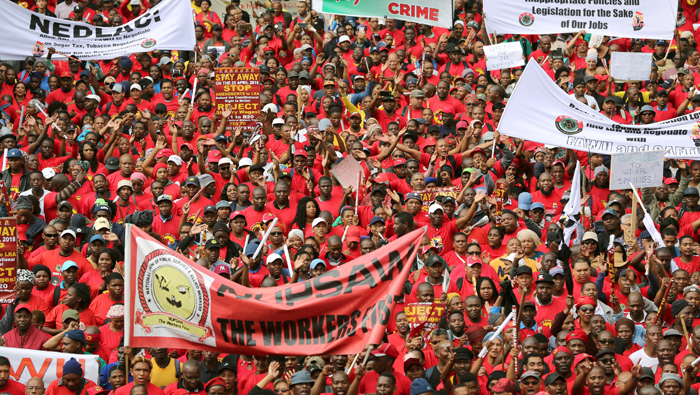
Johannesburg: Several thousand South African union members marched in Johannesburg on Wednesday to protest a proposed national minimum wage they called inadequate, presenting a test for President Cyril Ramaphosa.
Ramaphosa sees the minimum pay as an important step to tackle labour instability and wage inequality. He has staked his reputation on revamping a stuttering economy and rooting out corruption associated with Jacob Zuma, whom he replaced as president in February.
The 20-rand ($1.60) an hour minimum wage was approved by the cabinet in November and meant to be introduced on May 1. But a parliamentary committee recently sent the wage bill back to the labour ministry for re-drafting amid disagreements over its contents.
In the commercial hub, Johannesburg, on Wednesday, protesting workers marched to the labour ministry holding aloft placards.
"A minimum wage of 20 rand an hour is a spit in the face of the working class. Ramaphosa has sold out workers," said Moses Modisane, a shop steward for metalworkers union NUMSA who works at an Anglo American mine near the city.
"This is the only way to make our voice heard. We want a decent living wage," said Theodor Njilo, a caterer earning less than 6,000 rand ($480) a month. Supporters of the minimum wage say it will reduce inequality and stimulate economic growth as workers spend more.
Critics say it could lead to increased unemployment, already at record highs, because some employers won't be able to afford higher wage bills. The South African Federation of Trade Unions (SAFTU), which says it represents 30 unions with around 800,000 members, organised six marches countrywide to call for the government to radically alter the wage legislation.
"We want to send the strongest message to those who are selling us out," SAFTU General Secretary Zwelinzima Vavi said. "We did not suffer under apartheid for 20 rand an hour," Vavi told a crowd of workers outside the headquarters of the ruling party, the African National Congress (ANC).
SAFTU, which was founded last year, says it was excluded from talks over the minimum wage. It is also angry over proposed amendments to South African labour law that would require unions to undertake an extended conciliation process and organise a secret ballot before workers could strike.
The government says it held months of negotiations with unions and employers before the minimum wage was introduced.
COSATU, the country's biggest trade union federation, which supported Ramaphosa's bid for the leadership of the ANC, distanced itself from the protest and said it supported the minimum wage.